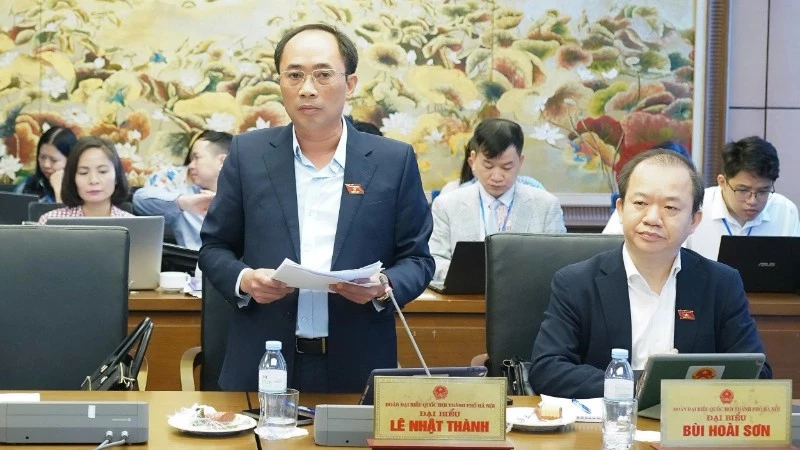 |
| Delegate Le Nhat Thanh ( Hanoi ) spoke. |
Clarifying existence and limitations
At the group discussion session on the morning of October 21 on the socio -economic situation, many National Assembly deputies said that the National Target Programs have made an important contribution to improving people's lives, especially in ethnic minority and mountainous areas.
However, it is necessary to continue to remove difficulties, overcome shortcomings in mechanisms, and improve implementation efficiency, focusing on innovating management, operation, and resource allocation methods.
Delegate Le Nhat Thanh (Hanoi) assessed that in the context of many complex changes in the world and the region, the Government has made great efforts and made great efforts, achieving many comprehensive achievements in the fields of socio-economy, social security, streamlining the apparatus, national defense-security and international integration.
However, delegates suggested that it is necessary to analyze and evaluate more deeply the management and use of resources, land, and public assets, especially the management of public assets after the administrative unit arrangement, in order to come up with appropriate solutions to avoid loss and waste of national and local resources.
In addition, delegates emphasized the need to focus on narrowing the rich-poor gap between regions and population groups, especially in ethnic minority and mountainous areas where access to public services is limited.
To solve this problem, the National Target Programs have been allocated huge resources and implemented resolutely, contributing to significantly improving people's lives.
Citing the results of reducing the multidimensional poverty rate from 4.4% to 1.3%, delegates acknowledged the clear effectiveness of the National Target Programs in recent times, but noted that the capital disbursement rate is still low, and the coordination mechanism is still inadequate and overlapping. From there, delegates suggested that it is necessary to carefully assess the shortcomings and limitations in the implementation of the National Target Programs.
Regarding the National Target Program on Socio-Economic Development of Ethnic Minority and Mountainous Areas, of the 9 specific target groups assigned in Resolution No. 120 of the 14th National Assembly, 3/9 target groups have not been achieved, including the target group on improving technical infrastructure and social infrastructure in extremely disadvantaged communes and extremely disadvantaged villages in ethnic minority and mountainous areas; the target group on the number of communes and villages out of extremely disadvantaged areas; the target group on sedentarization and resettlement, fundamentally solving the shortage of residential land and production land for ethnic minorities.
Delegates said that these targets are in fact very difficult to achieve, requiring huge resources, suitable local land funds and drastic efforts from Party committees, authorities and people of relevant localities.
Therefore, delegate Le Nhat Thanh suggested that the Government should focus on directing more drastically and effectively, especially innovating the coordination mechanism between relevant agencies and localities, promptly removing difficulties and obstacles, promoting capital disbursement to implement the program to bring about positive changes in ethnic minority and mountainous areas in the coming time.
Increase decentralization, reduce overlap
Also expressing concern about this issue, delegate Lo Thi Luyen, Deputy Head of the National Assembly Delegation of Dien Bien province, said that there are currently 5 national target programs being implemented, including sustainable poverty reduction; new rural construction; socio-economic development in ethnic minority and mountainous areas; drug prevention and control; cultural development. In the coming period, the Government plans to add 2 new programs on health care, population and development; modernization and improvement of the quality of education and training.
From the practical implementation of the three major national target programs, delegate Lo Thi Luyen commented that there are many difficulties, problems and inadequacies in mechanisms, processes and procedures.
Citing specific evidence, the female delegate said that in 2021, the programs could not be implemented; by the end of 2022, the system of guiding documents, including 43 legal documents and more than 100 guiding documents, would be completed, many of which would need to be adjusted. The disbursement rate by the end of September 2025 would only reach 68% of the plan, of which investment capital was 76.2% and public service capital was 57.5%.
From there, delegates welcomed and supported the policy of integrating 3 National Target Programs: Sustainable poverty reduction, new rural construction, socio-economic development in ethnic minority and mountainous areas to unify management and operation mechanisms, avoid duplication, reduce procedural burden, and increase efficiency in resource use.
Delegates also recommended that in the coming period, a comprehensive national target program on socio-economic development in particularly difficult areas should be issued, focusing resources on implementation to achieve clear results, while decentralizing and empowering localities to proactively implement and take responsibility.
For localities that have not yet balanced their budgets and are receiving central budget support of 70% or more, delegates also recommended that these localities should not be required to provide counterpart funding when implementing the program, because the more difficult the locality is, the more funding is allocated to implement the program, and limited local budgets will not have enough funding to provide counterpart funding to implement the program.
According to Nhan Dan Newspaper
Source: https://baoquangtri.vn/xa-hoi/202510/tap-trung-thao-go-kho-khan-nang-cao-hieu-qua-trien-khai-cac-chuong-trinh-muc-tieu-quoc-gia-0db15e4/


![[Photo] Da Nang residents "hunt for photos" of big waves at the mouth of the Han River](https://vphoto.vietnam.vn/thumb/1200x675/vietnam/resource/IMAGE/2025/10/21/1761043632309_ndo_br_11-jpg.webp)

![[Photo] Prime Minister Pham Minh Chinh received Mr. Yamamoto Ichita, Governor of Gunma Province (Japan)](https://vphoto.vietnam.vn/thumb/1200x675/vietnam/resource/IMAGE/2025/10/21/1761032833411_dsc-8867-jpg.webp)

![[Photo] Prime Minister Pham Minh Chinh meets with Speaker of the Hungarian National Assembly Kover Laszlo](https://vphoto.vietnam.vn/thumb/1200x675/vietnam/resource/IMAGE/2025/10/20/1760970413415_dsc-8111-jpg.webp)

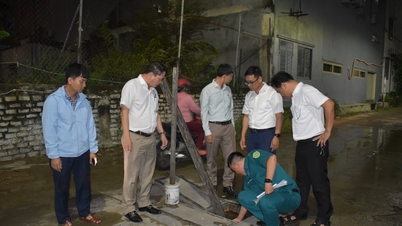



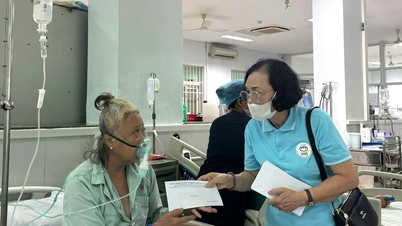
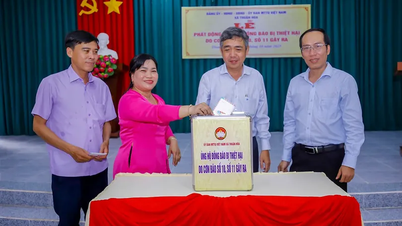










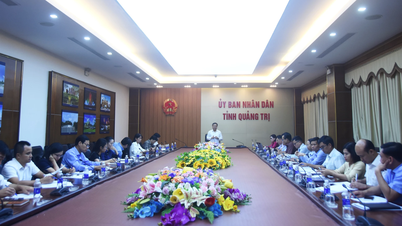









































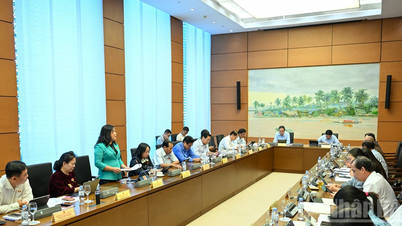

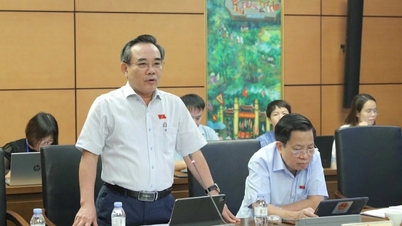
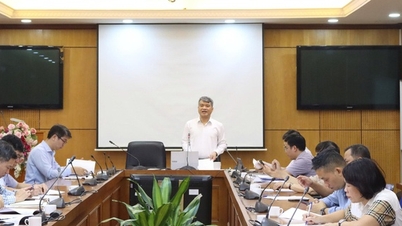
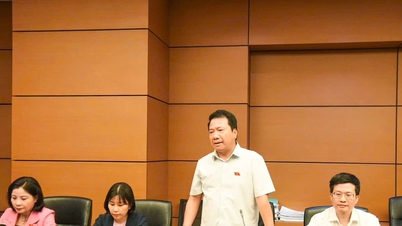

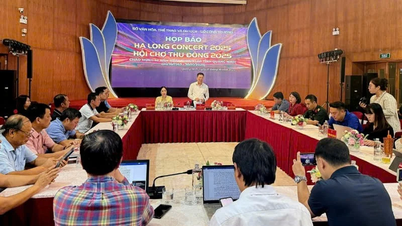









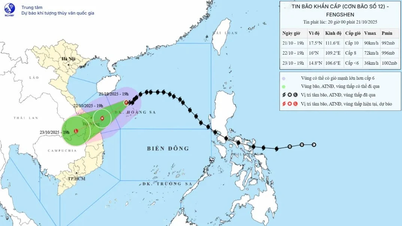




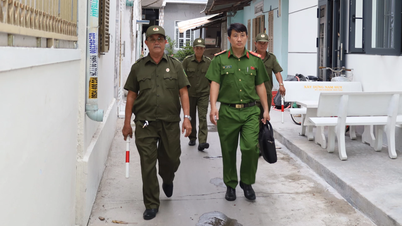














Comment (0)